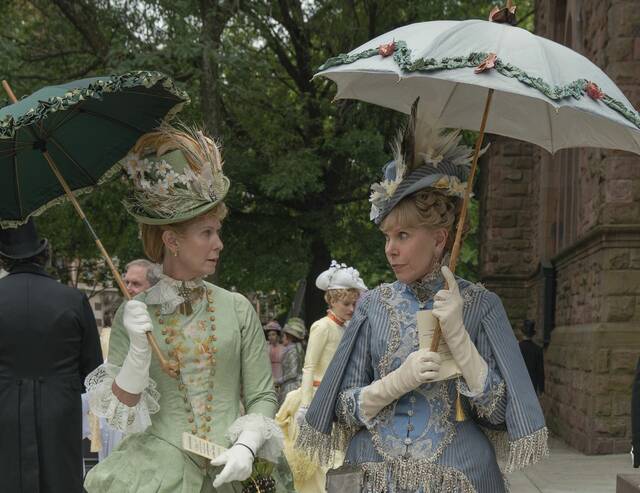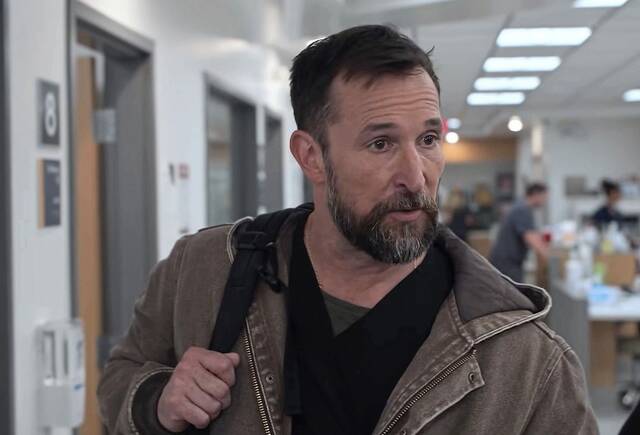In season two of “The Gilded Age” (9 p.m. Sunday on HBO and Max), all roads lead to Pittsburgh.
From writer Julian Fellowes, “The Gilded Age” (aka the American “Downton Abbey”) continues to unfurl the soapy stories of gloriously costumed upstairs/downstairs families and staff in Manhattan circa 1883. “The Gilded Age” is the post-Peak TV equivalent of a bon-bon, a beautiful to behold sweet treat that goes down easy.
This season’s Pittsburgh connection is new money George Russell (Morgan Spector) and his preoccupation with a steel mill strike, which he refers to as “some troublesome business in Pittsburgh.”
Meanwhile, his wife, perpetual social status climber Bertha (Carrie Coon, who really deserves Emmy recognition for this role), fires the first shot in “the opera war” as she spearheads construction of New York’s Metropolitan Opera house (and, boy, do things get built quickly on this show!). The Met is a rival to the old money’s Academy of Music, favored by Mrs. Astor (Donna Murphy) and the Russells’ neighbors, Agnes Van Rhijn (Christine Baranski, who still gets all the best lines) and Ada Brook (Cynthia Nixon).
Ada gets a potential love interest in a new church rector (Robert Sean Leonard), which doesn’t sit will with Agnes, who gripes, “We have to listen to him drone on all Sunday morning. Could the good Lord want more from us than that?”
Agnes’ niece Marian (Louisa Jacobson) begins teaching in a school and Agnes tries to set Marian up with a widower.
Agnes’ former secretary, Peggy Scott (2014 Carnegie Mellon University grad Denée Benton), continues writing for a Black newspaper while getting over a tragic loss and then makes a risky trip to the deep South with her editor, T. Thomas Fortune (Sullivan Jones).
Fellowes and executive producer Sonja Warfield continue to weave in historical stories of the period, including a fascinating true story behind the construction of the Brooklyn Bridge.
And then there are the staff members in the homes of Russell and Van Rhijn, whose stories include a romance, a patent application and a servant’s surprise return in an unexpected manner.
It’s a fantastic season of romance, mansions, trips to Newport and scheming in the cleanest (No profanity! No gore! No nudity!) series on HBO.
“The Gilded Age” season finale, while leaving some loose ends, addresses the question at the heart of the series: Will the new people be accepted and succeed the old money crowd? It suggests the show might be done after two seasons.
If this is the end for “The Gilded Age,” bravo to the series for delivering two near-perfect seasons. But I do hope we’ll get to spend more time with these fantastic characters.
‘Gilded’ in Pittsburgh
In a recent HBO Zoom press conference for “The Gilded Age,” Fellowes acknowledged that George Russell’s striking workers in Pittsburgh are modeled after the real history of the 1892 Homestead strike.
“You realize that people were earning their living and putting their lives at risk every day,” Fellowes said. “I wanted to expose that in the show but also examine it.”
Fellowes said the strike story in “The Gilded Age” was also inspired by the supposed reason Queen Elizabeth never wanted to meet Mary, Queen of Scots: She thought if she knew her, she’d never be able to execute her if necessary.
“I think that’s true in so many relationships in our lives, that we can deal with people as long as we don’t know them and take their emotions into account and that’s what we explore in our strike story,” Fellowes said. “It was really based on the Homestead strike, which is when Frick got the governor to send in the militia and on Frick’s orders, he opened fire on his own workforce. Now we all think of the Frick Collection and it’s all so charming but Frick was a pretty terrible man. On top of it, you have Carnegie, who was conveniently overseas while this was going on and is like, ‘What happened while I was gone? Oh, I would never I would never have done that.’ Carnegie, who took over his own reputation and decided he wanted to be remembered as a benevolent supplier of libraries when he had been one of the toughest robber barons of all of them.”
“The only thing worse than a union man is a clever union man,” George Russell says in Sunday’s season premiere, several episodes before he travels to the Steel City. By the way, the Pittsburgh scenes were shot in New York.
Executive producer Sonja Warfield said it was important to her to humanize the workers in “The Gilded Age” strike story.
“My grandfather was a steelworker — he worked for Republic Steel in Ohio — so that was the most important part of the story for me,” she said, “that we would see them as human beings, which is the key factor in the story as we tell it.”
Kept/canceled
Netflix renewed “Sweet Magnolias” for a fourth season.
Amazon renewed “Gen V” for a second season.
The CW ordered a second season of the fall’s best new comedy, “Everyone Else Burns,” which has its first season premiere at 9:30 p.m. Oct. 26.
Apple TV+ canceled “The Problem with Jon Stewart” after Apple execs became uncomfortable with some of his topics for the third season (China, AI), per The New York Times.
Channel surfing
In addition to its regular Saturday night telecasts on PCNC and the WPXI Now app, the season finale of WPXI’s revival of “Chiller Theater” will air on Channel 11 at 1 a.m. Sunday following NBC’s “Saturday Night Live.” … One of Adult Swim’s first original series, “Aqua Teen Hunger Force,” returns for a 12th season at 11:30 p.m. Nov. 26.










